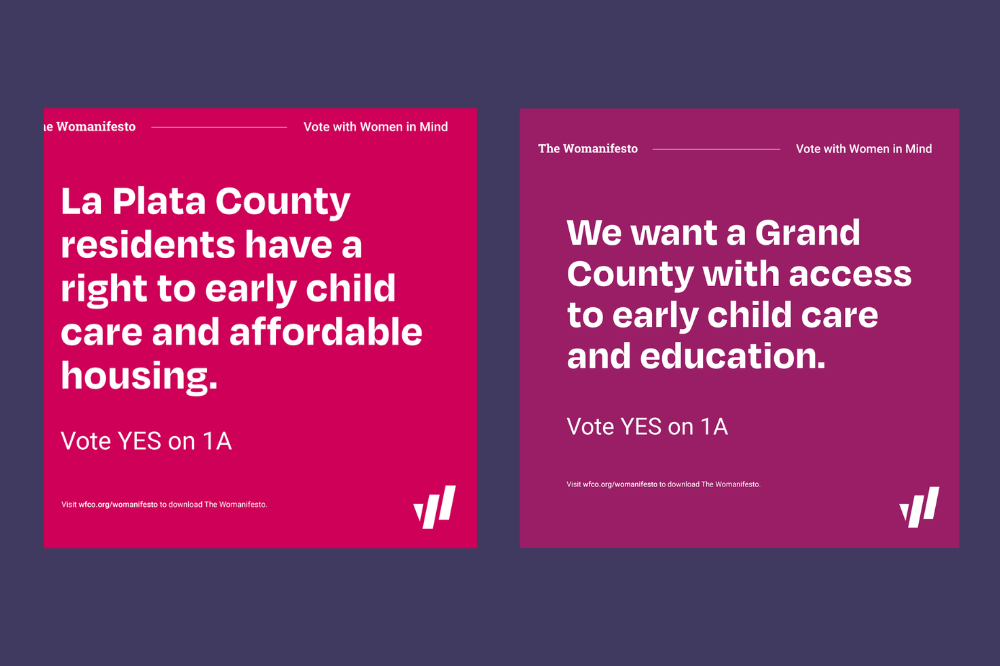
Guest Blog: Vote Yes on 1A
Creating New Tools for Community Challenges: The frontier is ahead for early childhood public investment in Colorado
 Katy Hale is the executive director of Grand Beginnings, a nonprofit organization promoting a child-centered school readiness system that fosters early learning, facilitates healthy child development, and promotes family success in Grand and Jackson Counties. This article originally appeared in Sky-Hi News on Oct. 28, 2024.
Katy Hale is the executive director of Grand Beginnings, a nonprofit organization promoting a child-centered school readiness system that fosters early learning, facilitates healthy child development, and promotes family success in Grand and Jackson Counties. This article originally appeared in Sky-Hi News on Oct. 28, 2024.
Vote yes on 1A in Grand, La Plata counties
Getting a child care referral shouldn’t be traumatic, but here I was, trying to hold space for Erin* as she sobbed. Erin was a single mother of a two-month-old boy. Her family leave was ending in three weeks, and she was ready to find care for him so she could go back to work. She was surprised to hear that our county didn’t have a single infant spot available. She was devastated to learn that the waitlist was anywhere between 9 and 36 months.
As the reality of her situation set in, so did the emotions. She wouldn’t be able to return to work in three weeks. It would be much longer. She didn’t have the option to extend her leave—she was going to lose her job. Her career had been paused indefinitely. How would she pay the bills? Could she even keep living in our community? The resources I was able to offer fell far short of fixing her crisis. And worse, having child care referrals end in tears was becoming a trend in our office. How did our community get to the point where Erin’s situation is not the exception, but the norm?
Licensed care slots exist for only 14% of infants and 24% of toddlers in Grand County
Local resource and referral data clarify why Erin’s situation is commonplace. Licensed care slots exist for only 14% of infants and 24% of toddlers in the region, meaning most families with children ages 0-3 lack access to licensed care. Moreover, while child care is considered affordable at 7% of household income, a dual-income household earning average local wages with two children under age five spends over 24% of their income on full-time care/education in Grand County, while a single-parent spends nearly half of their income.
Meanwhile, regionally, statewide, and nationally, high-quality care and education programs struggle financially, keeping teacher wages low just to keep their budgets in the black. These factors don’t leave much opportunity for private market correction—we have an early care and education system that no longer works for families, employers, and communities.
The solution is public investment in local early childhood systems
The solution is public investment in local early childhood systems. A few local communities already have dedicated early childhood tax revenue working for them, like Summit County’s Right Start, San Miguel County’s Strong Start, and the Denver Preschool Program. But most Colorado communities still lack local tax funding for early childhood–we’re still on the frontier when it comes to realizing this opportunity as a state.
We must be realistic when considering local tax streams for early childhood. Local communities, particularly smaller ones, are already under intense pressure to adequately fund essentials such as emergency/fire services, libraries, schools, and more from a limited tax base. Adding a local tax for early childhood must be done carefully to avoid competing with or taking away from other needed community services. Even with local tax dollars, historic underinvestment in early childhood means a community’s child care woes won’t be completely ameliorated—the financial need in early childhood is too immense. Even if they could, early childhood systems should likely be funded through a combination of local, state, and federal funds, just like the K-12 education system.
Measure 1A leverages tourist economy and does not burden homeowners
But just because local tax streams are not a silver bullet to early childhood doesn’t mean that they can’t be critically impactful to individual communities. For us in Grand County this November, Commissioners are asking local voters to approve a tax measure in the form of a .2% lodging tax raise and reallocation from marketing toward local child care and affordable housing – a structure that leverages our tourist economy and doesn’t burden homeowners with additional property taxes. Commissioners intentionally built in flexibility to ensure evolving needs can be addressed. If approved by the voters, this will allow us to invest in early childhood at an unprecedented level. It won’t dissolve every child care problem overnight, but if allocated strategically and consistently over time, we can move the needle locally to make Erin’s experience a rarity—a win for our young children, our families, our employers, and our community.
In presidential election years, it’s easy to focus on nationwide rhetoric and hype, but it’s essential to concentrate on state, regional, and local issues and candidates further down the ballot because these issues and candidates also have a substantial impact on your community, family, and financial future. Don’t miss your opportunity to weigh in! Register to vote, educate yourself on the issues, and please vote all the way down your ballot. Remember, local measures (like ours in Grand County) matter this November.
*Name changed for confidentiality
The Women’s Foundation of Colorado is a nonpartisan organization. The opinions of guest bloggers are their own and do not necessarily reflect the opinions or positions of The Foundation.
Check out The Women’s Foundation of Colorado’s 2024 ballot guide, The Womanifesto, for all of our positions, including 1A.

